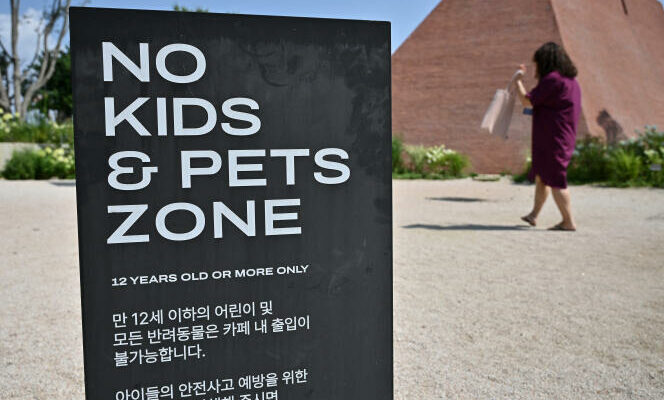LETTER FROM SEOUL
If South Korean society suffers from a declining birth rate, it is no coincidence: the simple presence of children tires it. As proof, the numerous brands which refuse entry to young people. “At first we had baby seats, but there were too many problems. The little ones screamed, threw the food, refused to eat it. Their behavior could embarrass others. But our prices are quite high and customers expect a service that meets the standards”, explains Iyo Iyo (a real name), the representative of a rather chic sushi restaurant in the heart of the capital. Like hundreds of others, the establishment does not accept children. The mention the reference “no kids zone” even appears on its menu.
This trend is growing in South Korea, where the Jeju Research Institute has identified 542 “no kids zones”. A map created by Internet users on Google There are 459 of them. The phenomenon is worrying in a country where the population is declining and where prohibited areas concern more and more categories of the population. Min-ah Lee, a sociologist from Chung-Ang University in Seoul, sees this “a growing tendency towards exclusion between groups, and a growing refusal to understand the other”.
Legal Liability Issues
The first child-free zones date back to the early 2010s and are primarily linked to legal liability issues. An incident in a restaurant is first blamed on the owner. In 2013, the Pusan court ordered a restaurateur to pay 41 million won (28,700 euros) to a family. A waiter accidentally spilled boiling water on a 10-year-old child who hit him while he was running towards a games room set up in the establishment. Between 2018 and 2023, 2,943 child safety-related accidents occurred in hotels and restaurants, according to the Korea Consumer Agency. Each time, the managers were convicted.
According to a survey published in December 2023 by the Ministry of Health, 68% of cafe and restaurant owners justify the choice to refuse children by “excessive burden of responsibility”. The reason comes before others, such as a menu not suitable for children – too spicy for example –, a lack of space or the fear of ruckus disturbing other customers.
The question is causing lively debate, because South Korea is experiencing an accelerated demographic decline, with a fertility rate of 0.72 children per woman in 2023 (1.68 in France). “Children are naturally immature and learn good manners from contact with others. “No kids zones” reflect the culture of a society that ostracizes children and their families”deplores Yong Hye-in, elected from the Minimum Income Party, a small progressive group.
You have 50% of this article left to read. The rest is reserved for subscribers.
